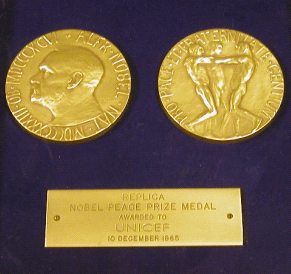| |
Special Exhibits from UNICEF Archives
UNICEF Nobel Prize
Medal Replica,
Scroll
and Wall sheet, 1965
Two decades of
service to children culminate on 26 October 1965 when UNICEF is
awarded the 1965 Nobel Peace Prize for "fulfilling the condition of
Nobel's will, the promotion of brotherhood among the nations� and
emerging on the world stage as a �a peace-factor of great
importance.�
UNICEF had increasingly became a world-wide symbol for cooperation
involving the international community, governments and people in a
global partnership to take advantage of substantial opportunities
for improving the lives of the world�s poorest children.
The international action promoted by UNICEF was forging a link of
solidarity between rich and poor nations and was helping fulfill
Alfred Nobel�s dream of world peace.

UNICEF Executive Director Henry Labouisse's acceptance speech
The Executive
Director of UNICEF, Henry R. Labouisse. elaborating on this theme,
stated: �To all of us in UNICEF the prize will be a wonderful
incentive to greater efforts in the name of peace. You have given us
new strength. You have reinforced our profound belief that each time
UNICEF contributes. however modestly, to giving today�s children a
chance to grow into useful and happier
citizens, it contributes to removing some of the seeds of world
tension and future conflicts.�
Referring to the more than 120 government who contributed on a
voluntary basis to UNICEF�s budget and almost the same number
receiving UNICEF�s assistance he said �Such world-wide cooperation
contributes, in itself, to a better understanding within the family
of Man. But to me, the great, the most important meaning of this
Nobel award is the solemn recognition that the welfare of today�s
children is inseparably linked with the peace of tomorrow�s world.
The sufferings end privations to which I have referred do
not ennoble: they frustrate and embitter. The longer the world
tolerates the slow war of attrition which poverty and ignorance now
wage against 800 million children in the developing countries, the
more likely it becomes that our hope for lasting peace will be the
ultimate casualty.�

Danny Kaye, UNICEF
Ambassador, at the Nobel Awards Ceremony.
This theme was reiterated by the United Nations General Assembly
when in its 1966 resolution on UNICEF it applauded the Nobel Peace
Award to UNICEF �which reinforces understanding of the importance
for peace in the world of the welfare and recovery of children in a
spirit of friendship among nations�.
On exhibit below are the original telegram and letter awarding
UNICEF the Nobel Prize from the Nobel Committee (click to access
larger size), a replica of the Nobel Prize, the Nobel Scroll and a
UNICEF wall sheet commemorating the Prize, also available in a
higher resolution version.

(click picture for
display size)
"URGENT THE
NOBEL COMMITTEE OF THE NORWEGIAN PARLIAMENT HAS TODAY
AWARDED TO UNICEF THE NOBEL PEACEPRIZE FOR 1965 STOP MUST
NOT BE PUBLISHED TIL 6 PM NORWEGIAN TIME STOP LETTER
FOLLOWS"
-25 October 1965

(click picture for
display size)

(click picture for
display size)

(click picture for
display size)

(click picture for
display size) |

(click picture for
display size)
"Compassion
Knows No National Boundaries"
"Everyone has understood the language of UNICEF...Even the
most reluctant person is bound to admit that in action
UNICEF has proved that compassion knows no national
boundaries. Aid is given to all children without any
distinction of race, creed, nationality or political
conviction...UNICEF has become an international device
capable of liberating hundreds of millions of children from
ignorance, disease, malnutrition and starvation...The aim of
UNICEF is to spread a table decked with all the good things
that Nature provides for all the children of the
world...UNICEF offers young people an alternative worth
living and working for, a world of freedom for all people,
equality between all races, brotherhood among all men."
From Nobel Citation Awarding UNICEF
Nobel Prize for Peace, 1965 |
|
Nobel Peace Prize
|
UNICEF.org Nobel Prize
(scroll down)
Nobel Peace Prize 1965 - Links
|
CF-RAI-USAA-DB01-HS-2005-00110 |
|
|







